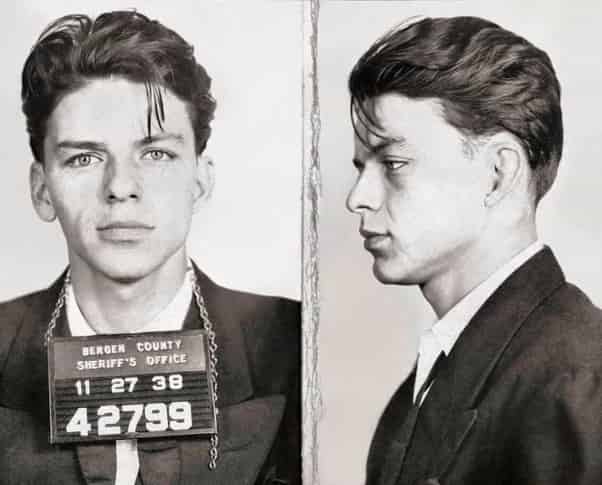Frank Sinatra: A Champion for Equality During the Civil Rights Movement

Frank Sinatra wasn’t just a music legend—he was also a strong advocate for civil rights.
During a time when racial discrimination was common in the United States, Sinatra stood firm against it. He actively supported equality and fought against racial segregation in his personal and professional life.
Refusing Racism in Entertainment
Sinatra made it clear that he would not tolerate racism, especially in the entertainment industry. He refused to stay at hotels or perform at clubs that denied entry to Black people. Sinatra didn’t just advocate for fair treatment in words; he showed it in action. He ensured that Black musicians in his band received the same pay and respect as their white counterparts.
This unwavering stance made a significant difference, particularly in Las Vegas. At the time, Las Vegas was a booming entertainment hub but was deeply segregated. Black performers could entertain audiences in showrooms but were not allowed to stay in the hotels where they performed. Sinatra saw this injustice and took a stand, using his influence to push for change.
Leading the Charge in Las Vegas Integration
Frank Sinatra’s efforts to integrate Las Vegas are legendary. His son, Frank Sinatra Jr., reflected on his father’s role in a 2016 interview. He explained how his father confronted the powerful but morally questionable figures who ran the casinos and hotels in Las Vegas.
During one such conversation, Sinatra challenged them, saying:
“Are you guys going to come into the twentieth century, or aren’t you?”
One of the board members reportedly argued that they had separate spaces for white and Black people. Sinatra wasn’t having it. He pointed out that money doesn’t have a color, famously saying:
“The money is green. How about that?”
This argument struck a chord. Sinatra’s persistence and the support of his friend Sammy Davis Jr., a talented Black performer, led to Las Vegas becoming a more inclusive city. Soon, Black performers and patrons could stay at the same hotels and enjoy the same services as white guests.
Supporting the Civil Rights Movement
Frank Sinatra didn’t just fight for equality in the entertainment industry. He was also a key supporter of the broader Civil Rights Movement. He was a friend and ally of Martin Luther King Jr., actively helping to raise money to support the movement’s goals. Sinatra often headlined fundraisers and used his platform to amplify the message of equality and justice.
In 1958, Sinatra expressed his beliefs in an article for *Ebony* magazine. He wrote:
“A friend to me has no race, no class and belongs to no minority. My friendships are formed out of affection, mutual respect, and a feeling of having something in common. These are eternal values that cannot be classified.”
This powerful statement highlighted Sinatra’s commitment to seeing people as individuals, not as labels defined by race or class.
A Lasting Legacy
Frank Sinatra’s work for civil rights went beyond words. He used his fame and influence to challenge discrimination, creating real change during a pivotal time in American history. His actions helped break down barriers in Las Vegas and set an example for others in the entertainment industry to follow.
Sinatra’s legacy as a civil rights advocate is a reminder that everyone has the power to fight for what’s right. Whether through speaking out or taking action, his efforts made a lasting impact on the fight for equality.
Today, Sinatra is remembered not only as a music icon but also as someone who used his platform to stand against injustice. His dedication to fairness and respect continues to inspire people around the world.
Frequently Asked Questions (FAQ) about Frank Sinatra and His Role in Civil Rights
1. What did Frank Sinatra do to support the Civil Rights Movement?
Frank Sinatra was an active supporter of the Civil Rights Movement. He helped raise money for Martin Luther King Jr. and the movement by headlining fundraising events. He also publicly spoke out against racism and took action to ensure that Black performers were treated equally in the entertainment industry.
2. How did Frank Sinatra help integrate Las Vegas?
Sinatra played a key role in integrating Las Vegas. At the time, Black performers could work in showrooms but were not allowed to stay in the hotels. Sinatra used his influence to challenge the hotel and casino owners, stating that “the money is green” and should be available to all. His efforts, along with the support of Black performers like Sammy Davis Jr., led to the integration of Las Vegas.
3. Was Frank Sinatra racist?
No, Frank Sinatra was not racist. In fact, he was a strong anti-racist who fought against segregation and discrimination throughout his career. He refused to perform at or stay in hotels that discriminated against Black people, and he advocated for equal treatment for Black musicians and entertainers.
4. How did Frank Sinatra view race and class?
Frank Sinatra believed in judging people by their character, not their race or class. In a 1958 interview with *Ebony* magazine, he said, “A friend to me has no race, no class and belongs to no minority.” He valued friendship based on affection, respect, and common interests, rather than superficial labels.
5. What impact did Sinatra’s actions have on the entertainment industry?
Sinatra’s efforts helped break down racial barriers in the entertainment industry, particularly in Las Vegas. He showed that talent should not be limited by race, and his support for Black performers and civil rights helped push for more inclusive practices in hotels, clubs, and concert venues.
6. Did Frank Sinatra have any personal friendships with Black celebrities?
Yes, Frank Sinatra was friends with several Black entertainers, including Sammy Davis Jr. He was deeply supportive of Davis and other Black performers, and their friendship was instrumental in challenging the racist practices of the entertainment industry.
7. Did Frank Sinatra face backlash for his support of civil rights?
Although Sinatra faced criticism from some for his progressive views, particularly in an era of widespread racial segregation, he remained committed to his beliefs. He used his fame to challenge discrimination, and his support for the Civil Rights Movement helped change the cultural and social landscape of his time.
8. Why is Frank Sinatra considered a civil rights hero?
Sinatra is considered a civil rights hero because of his outspoken efforts to fight racism and discrimination, both in the entertainment industry and beyond. His commitment to equality, fairness, and justice, along with his personal actions to integrate Las Vegas and support the Civil Rights Movement, made him a key figure in the fight for racial equality.
9. What were some of Frank Sinatra’s most famous songs?
Some of Sinatra’s most iconic songs include “My Way,” “Fly Me to the Moon,” “New York, New York,” and “Strangers in the Night.” These songs, among many others, cemented his place as one of the greatest crooners of all time.
10. How did Frank Sinatra’s views on race influence future generations?
Sinatra’s actions and views on race had a lasting impact on future generations of artists and activists. His support for civil rights and his refusal to tolerate racial segregation inspired others to use their influence for social justice, paving the way for greater inclusivity in the entertainment industry and beyond.
